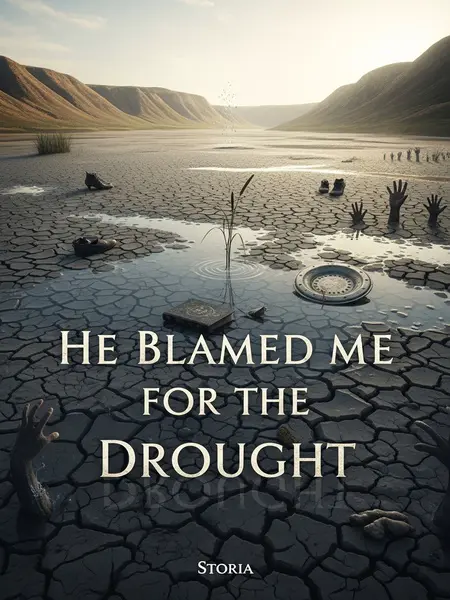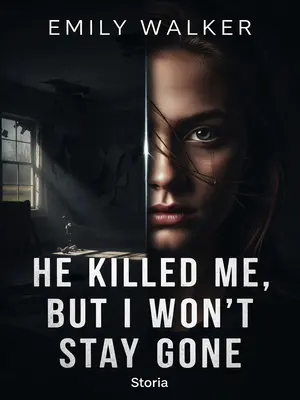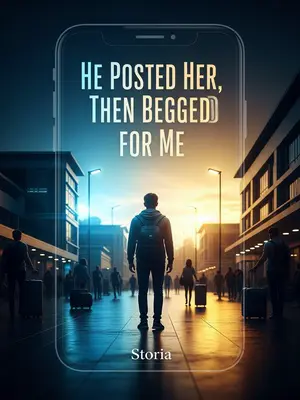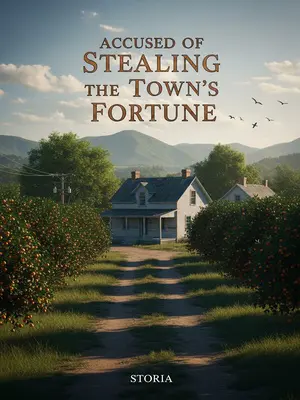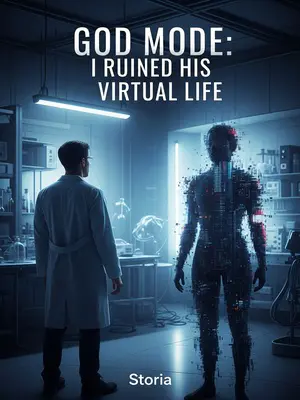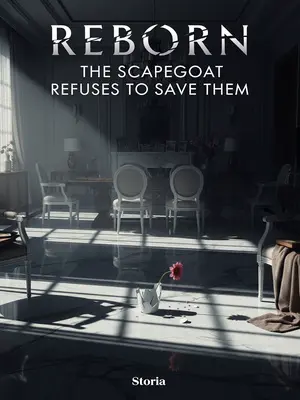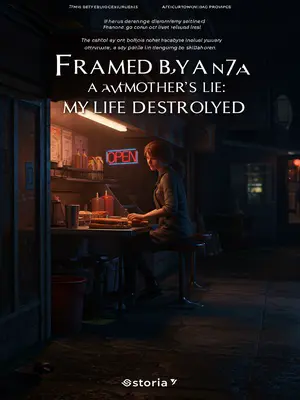Chapter 7: Bound by Thirst and Hope
It was a small gesture, but it meant something. I watched him go, unsure what to make of it.
The daytime commotion faded, but at night someone came with a lantern to the river valley.
The world was quiet, the stars bright. A single lantern bobbed along the riverbank, casting long shadows.
He stumbled around, making a racket.
He tripped over rocks, muttered curses, and nearly dropped the lantern twice. I couldn’t help but smile.
Unable to bear it, I appeared: “Are you looking for me?”
My voice startled him, and he spun around, eyes wide. The lantern shook in his hand.
The young preacher was startled, and after a while he spoke: “Are you really the spirit in charge of all the country’s rivers, lakes, and rain?”
He studied me, searching for something—truth, maybe, or just reassurance.
His question was tricky.
It was the kind of question you could never really answer. I hesitated, unsure what to say.
I felt a little guilty: “Do I not look like one?”
I tried to sound confident, but my voice wavered. I felt exposed, like a frog under a magnifying glass.
“If you’re a spirit,” he came closer to look, “can you grant me three wishes?”
He grinned, teasing. I rolled my eyes, but I couldn’t help but smile a little.
I frowned: “No, but I can give you three big slaps.”
It was a weak joke, but it broke the tension. He laughed, the sound bright in the night air.
“So stingy,” he said, obviously unhappy, crossing his arms and thinking for a while.
He pouted, pretending to be offended. I shook my head, amused despite myself.
“Then can I touch you?”
The question caught me off guard. I stared at him, unsure what he meant.
I was puzzled: “What…?”
He stepped closer, lantern light flickering across his face. His eyes were bright, curious.
By lantern light, the young man’s face was bright, with a pair of sly eyes.
He looked mischievous, but there was a sincerity in his gaze that made me pause.
“I want to know what a spirit is like. Are you the same as a human?”
His voice was soft, almost shy. I hesitated, then rolled up my sleeve.
He asked very sincerely. “Please, good spirit.”
There was something earnest in his tone. I nodded, holding out my arm.
I hesitated for a moment, rolled up my sleeve, and exposed an arm: “Go ahead.”
He reached out slowly, as if afraid I might vanish. His touch was warm, gentle.
“Thank you.” He thanked me before touching—at least he was polite.
His fingers brushed my skin, lingering for a moment. I shivered, surprised by the sensation.
His warm palm pressed close, then gripped my wrist and squeezed.
He studied my arm, turning it this way and that. I watched, curious and a little nervous.
“Hmm,” he pondered, “feels cool, like putting your hand in a stream and touching a little fish.”
He grinned, satisfied. I laughed, the sound bubbling up unexpectedly.
…This human is really strange.
But I didn’t mind. It was nice, in a way, to be seen as something more than a force of nature.
“Are you called Brook?” he asked again, looking expectant, “A human-faced, fish-bodied spirit, riding two alligators, patrolling the country’s rivers and lakes—”
He recited the old legend, eyes shining. I shook my head, amused.
I’m not the Brook spirit.
I’d heard the story before, but it never fit me. I was too small, too ordinary.
“Creek,” I shook my head, “My name is Creek.”
He repeated it, rolling the word around in his mouth. It sounded right, somehow.
He drew a symbol on the ground with his finger: “Oh, your name means a little stream.”
He smiled, tracing the letters in the dust. For the first time in a long while, I felt almost proud of my name.
After that day, beside the broken rain spirit statue, on the Redwater River bank, it was deserted.
The crowds stopped coming. The riverbank was quiet, the only sound the wind in the dead grass.
I finally had peace.
It was a relief, but also a little lonely. I wandered the banks, unsure what to do with myself.
There was a dead oak tree on the riverbank, many years old, but it didn’t survive this year.
Its branches were bare, bark peeling away in strips. It stood like a skeleton against the sky, a reminder of what had been lost.
Someone called from the tree branches: “Little Creek! Little Creek!”
The voice was familiar, playful. I looked up, searching for its source.
I checked several times before realizing I was being called.
It took a moment to sink in. I wasn’t used to having a name, or someone to call it.
The preacher in dark robes held prayer cards, hymn sheets, and tinkling trinkets in his arms, sitting on a branch and waving, looking from afar like a red-furred fox.
He balanced precariously, grinning down at me. His robe was rumpled, his hair wild. He looked more like a trickster than a preacher.
I climbed up gloomily and sat beside him, puzzled: “What are you doing?”
The branch creaked under our weight, but he didn’t seem to mind. I settled beside him, curious.
“Working, of course. A preacher has lots to do every day.” He wrote with a pen, “I have to write blessings, interpret omens, write those useless prayer texts, burn them after writing, and let the smoke rise to the sky—as a sign to the spirits.”
He spoke as he scribbled, tongue sticking out in concentration. The papers fluttered in the breeze, covered in looping script.
I watched him for a while: “The spirits can’t receive what you write.”
It was true—words on paper never made it past the surface. He just shrugged, unconcerned.
He didn’t stop writing: “I know, so these are for people to see.”
He smiled, a little sad. “Sometimes hope is more important than truth.”
“But honestly, before I met Little Creek, I didn’t believe there were spirits in this world.”
He looked at me, eyes twinkling. “You changed that, you know.”
I asked: “You’re a preacher, a human messenger for the spirits, but you don’t believe in spirits?”
It seemed odd, but he just laughed.
“My granddad believed, and his dad believed, but I don’t.” He counted on his fingers, “I can play the harmonica, know some herbs… but it’s all just to make a living.”
He winked, as if sharing a secret. “Gotta eat, right?”
“Don’t tell anyone, or the President will fire me.”
He pressed a finger to his lips, grinning. I nodded, playing along.
I remembered the day he was tied up: “Doesn’t he want to fire you now?”
The memory made us both laugh, a little nervously.
He waved his pen: “I haven’t annoyed him lately, why would he fire me? I’m diligent.”
He puffed out his chest, pretending to be proud. I rolled my eyes, but couldn’t help but smile.
At this point,
He stared at my lips for a while: “Little Creek, are you very thirsty?”
His gaze was gentle, concerned. I hesitated, unsure how to answer.
I licked my lips, the dryness felt awful: “I…”
The words stuck in my throat. I wanted to say yes, but pride got in the way.
I couldn’t answer.
He didn’t press. Instead, he hopped down from the branch, landing lightly on the dusty ground.
He didn’t ask further, just jumped down from the branch.
He motioned for me to follow, and I slid down after him, curious.
Grabbing my hand, he walked halfway around the dead oak tree.
His grip was warm, steady. We circled the trunk, the bark rough beneath our fingers.
On the trunk where the bark had rotted, a dead branch had a cluster of small flowers growing from the side.
The flowers were pale, almost translucent, like tiny lanterns in the gloom.
He picked one and handed it to me: “Like this, pull out the core and suck on it, and there will be water to quench your thirst.”
He demonstrated, pulling the stem free and sipping the juice. I followed suit, the taste cool and sweet on my tongue.
He held the flower in his mouth: “No need to praise me for being smart… We humans are used to finding water like this. Even if it’s hard, we’ll try every way to survive in the cracks.”
He grinned, a little proud, a little sad. I nodded, understanding more than I could say.
Juice rolled into my mouth, cool and a little sweet.
It was the best thing I’d tasted in years. I closed my eyes, savoring it.
I copied what he often said: “…Thank you.”
He laughed, the sound bright and genuine. It felt good, sharing a small kindness.
The young preacher bowed his head and spoke to the flower: “Little flower, little flower, thank you.”
His words were soft, almost a prayer. I watched him, feeling something shift inside me.
During this time, he often came, and I got used to him calling me Little Creek.
The nickname stuck, warm and familiar. I started to look forward to his visits, to the sound of his voice.
There were too many prayer cards, he couldn’t finish copying, so he begged me to help.
He piled the cards in my lap, eyes wide and pleading. I hesitated, unsure what to do.
I pointed at myself: “Me?”
He nodded, grinning. “You’re a spirit, aren’t you? Spirits are supposed to be good at this sort of thing.”
“I can’t read.”
I admitted it, embarrassed. He just laughed, shaking his head.
He got interested again, wanting to teach me to read, tossing aside prayer cards and hymn sheets.
He drew letters in the dirt, sounding out words. I stumbled through the alphabet, blushing at my mistakes. He was patient, encouraging, never mocking.
Occasionally, a farmer carrying a shovel would pass by, seeing him acting suspiciously alone in the river valley.
The farmer would pause, eyeing us with suspicion. The preacher would wave, all innocence and charm.
The farmer asked: “Preacher, what are you doing?”
His voice was gruff, tired. He squinted at the cards, then at us.
He kept a straight face, reciting blessings and drawing crosses: “Don’t worry, I’m communicating with the spirits.”
He made a show of it, waving his arms, chanting nonsense. The farmer just shook his head, muttering under his breath.
He was used to lying on the spot.
It was almost impressive, the way he could spin a story at a moment’s notice.
Those blessings, neither humans nor spirits could understand.
They were just words, empty and meaningless. But sometimes, that was enough.
So, passersby spread the word: the preacher sets up crosses and chants blessings every day in the river valley, working hard for the livelihood of the world.
Rumors grew, and soon everyone believed the preacher was a tireless servant, fighting for their future. He let them believe it, never correcting the story.
The farmer greeted him and continued walking under the scorching sun with his shovel.
He wiped sweat from his brow, eyes fixed on the horizon. The sun beat down, relentless.
The young preacher called out: “Bill Hargrove, what about you, where are you going?”
His voice was friendly, teasing. The farmer paused, considering.
The farmer licked his cracked lips: “I’m going to look for snakes.”
It was an odd answer, but he said it with conviction. The preacher raised an eyebrow.
“Why look for snakes?”
The question was genuine. The farmer shrugged, shifting his shovel from one shoulder to the other.
“Where there are a lot of snakes, there are springs, so people can live.”
He explained it like it was common knowledge. The preacher nodded, impressed.
“Can you find them?”
The farmer hesitated, glancing at the dry ground. “It used to be easy, now… can’t say for sure.”
He muttered to himself: “But you have to look, people have to live.”
His voice was soft, almost a whisper. The preacher nodded, understanding.
“Right, Lord, people have to live.”
It was a simple truth, but it carried the weight of the world.
The young preacher didn’t ask more.
He watched the farmer go, silent. I felt a pang of guilt, wishing I could help.
I decided to leave the Redwater River for a while, to go far away.
The decision wasn’t easy, but I knew I had to try. Maybe, somewhere out there, I could find a solution.
The young preacher’s eyebrows drooped, looking a bit sad: “Where are you going?”
His voice was soft, almost pleading. I hesitated, unsure how much to tell him.
I want to find my mentor, the spirit living on Mount Tabor, who controls all natural causes and effects.
The mountain was far, hidden by clouds and legend. My mentor was wise, powerful—a true spirit, not a pretender like me.
When I was still a little stream, I learned by my mentor’s side, and he protected all of Silver Mountain.
Those days were simple, peaceful. The world made sense, and I felt safe.
Little fish swam in my waters, everything was clear and free.
The water sparkled, the sun was warm. I missed those days, more than I could say.
Mentor didn’t like to interfere in worldly affairs, living in seclusion in the mountains every day.
He taught me to watch, to wait, to let things unfold as they would. It was a hard lesson, but I tried to learn it.
When I became a spirit, mentor told me: “Nature follows fate. After becoming a spirit, don’t meddle in worldly matters, and don’t mention my name to mortals.”
His voice was gentle, but firm. I promised, even though I didn’t understand why.
After that, I entered the world, like my senior friends, and never saw mentor again.
I missed him, sometimes. The world was bigger and lonelier than I’d expected.
To find mentor, I must travel far. The Redwater River can’t be left unattended.
It felt like abandoning my post, but I didn’t see any other choice. Maybe, if I found him, I could bring back the rain.
But by now, it’s worth a try.
Desperation makes you brave, sometimes. Or maybe just foolish.
Mentor forbade me to mention him, so when asked where I was going, I kept silent.
I bit my tongue, looking away. The preacher watched me, worry etched on his face.
He asked again: “Then, Little Creek, when will you come back?”
His voice was hopeful, but I could hear the fear beneath it.
I said: “I don’t know. The mountains are high and the road is long, but I’ll be quick.”
I tried to sound confident, but my voice shook. He didn’t look convinced.
“The mountains are high and the road is long, Little Creek, but you look very weak.”
He frowned, concern deepening. I tried to reassure him, but the words felt hollow.
“I… I’m okay.” I hid my sleeve.
The truth was, I felt weaker every day. But I didn’t want him to worry.
He shook his head, his sly eyes looking at me sadly: “Can you not go?”
His words caught me off guard. I looked at him, surprised by the depth of his concern.
He grabbed both my hands, then hugged me—that’s how humans comfort each other.
His embrace was warm, awkward, but genuine. I hesitated, then hugged him back, feeling a strange comfort in the gesture.
I followed suit: “I’ll be back soon… you come find me again.”
I tried to make it sound light, but there was a heaviness in my chest. I didn’t want to say goodbye.
Before leaving, he gave me a bell bracelet woven with five-colored threads.
He tied it gently around my wrist, fingers trembling. The bells chimed softly, a promise of safety.
The young preacher tied it on my wrist, head lowered so I couldn’t see his expression.
I could feel his sadness, even without seeing his face. The bracelet felt heavy, meaningful.
“Little Creek, may you travel safely.”
His voice was soft, almost a whisper. I nodded, swallowing the lump in my throat.
I decided to leave at dawn the next day, but someone was lighting a bonfire by the river.
The flames flickered in the darkness, casting strange shadows on the water. I watched from a distance, uneasy.
At first, there was just one fire, crackling in the uneasy dark.
The fire crackled, sending sparks into the night. It felt like a warning, a signal.
Then, all around the riverbank, torches sprang up, one after another, like the land itself was waking up.
The fires multiplied, encircling the river. The air grew thick with smoke and chanting.
Someone chanted softly.
The voice was familiar, low and steady. I strained to hear the words, but they were old, strange.
Complicated ceremonial robes covered him, and the colored threads at his waist seemed to move on their own.
He moved gracefully, almost dancing. The bells at his waist chimed with every step.
I recognized the sly eyes behind the mask.
It was the preacher, but different—older, more powerful. I shivered, sensing danger.
He chanted those old blessings I didn’t understand.
The words curled around me, binding and heavy. I tried to resist, but it was no use.
Wherever a bonfire was lit, he had visited in recent days.
I realized too late—he’d been preparing for this, laying the groundwork for a trap.
Clear copper bells rang out. The blessings grew dense.
The sound filled my ears, drowning out everything else. I felt myself slipping, fading.
With each line he chanted, I grew weaker.
My strength drained away, leaving me hollow. I tried to call for help, but my voice was gone.
The formation took shape, and the five-colored thread on my wrist suddenly tightened.
It burned, digging into my skin. I gasped, clutching my arm.
It exposed the cracked skin on my wrist, spreading up my arm like fish scales drying in the sun.
The pain was sharp, electric. I watched in horror as the scales crept higher, shimmering in the firelight.
At the last moment, I gasped for breath.
My chest tightened, every breath a struggle. I felt myself slipping away.
Like the fish I raised that died of thirst.
The memory flashed before my eyes—silver bellies, empty eyes. I understood, finally, what it meant to be helpless.
…So thirsty.
My throat burned, my lips cracked. I would have given anything for a single drop of water.
“Is it thirsty like a human?”
The question echoed in my mind, strange and distant. I didn’t know the answer.
I frowned and opened my eyes, seeing a narrow, dim space, with only a few spots of light.
The room was small, the walls close. Light filtered in through cracks, dust swirling in the beams.
I saw the President again, the leader who had pointed his sword at the sky.
He stood over me, arms crossed, eyes cold. The memory of his anger sent a shiver down my spine.
Many colored threads and bells were tied to me, and any movement made them ring.
I tried to move, but the bells chimed, sharp and bright. The threads bit into my skin, holding me fast.
He picked up one and explained:
He spoke softly, almost kindly. It made the words sting even more.
“You are a spirit. You’re the same as humans, but also different. You won’t experience birth, aging, sickness, or death.”
His voice was steady, clinical. I listened, helpless.
“This thing makes you like a human, able to feel thirst, hunger, and pain.”
He held up the thread, letting it glint in the light. I flinched, understanding too late what it meant.
“…You become flesh and blood, unable to escape.”
The words settled over me, heavy as a storm cloud. I closed my eyes, wishing I could disappear.
I closed my eyes and asked what he wanted.
My voice was weak, barely a whisper. I already knew the answer, but I asked anyway.
What he wanted had never changed.
He wanted rain, wanted life, wanted hope. I had none to give.
He wanted me to give him water.
His eyes burned with need. I looked away, ashamed.
I had none.
I was empty, hollow, a shell of what I’d been.
I was too thirsty.
The thirst was all-consuming, a fire in my veins. I would have begged, if I’d had the strength.
My whole body was filled with a dry, fine pain.
Every nerve burned, every breath was agony. I wondered if this was what it meant to be human.
I opened my lips, my throat parched, and asked him for water to drink.
The words slipped out before I could stop them. I heard my own voice, small and desperate.
He hadn’t finished his demand, but his expression froze, almost laughing in rage.
He stared at me, incredulous. His mouth twisted into a bitter smile.
“You’re really dried up to this point?”
His voice was sharp, mocking. I looked away, unable to meet his gaze.
I didn’t answer, but my silence only made him angrier.
He paced the room, hands clenched. The anger radiated off him in waves.
“Are you doing this on purpose? Pretending to be pitiful? Aren’t you the rain spirit?”
His voice rose, echoing off the walls. I shrank back, wishing I could vanish.
He almost paced anxiously around the room.
His footsteps were loud, restless. I watched, numb.
“I think I should try every punishment on you, make your eyes and mouth cry, and then see whether you’re really dried up or not.”
His words were cruel, but I barely heard them. The pain was too much.
…
I didn’t have the energy to care what he was saying.
My thoughts drifted, scattered like leaves in the wind. I closed my eyes, letting the darkness take me.
My consciousness was hazy.
I floated, weightless, lost in a sea of thirst and pain. Somewhere, far away, I heard a voice calling.
I smelled a faint candle scent, the kind people light to pray.
The smell was sweet, comforting. It reminded me of old rituals, of hope and longing.
Cool liquid moistened my throat, and I heard someone calling me.
The water was a miracle, a blessing. I opened my eyes, searching for the source.
“Little Creek.”
The voice was soft, familiar. I reached out, desperate for comfort.
I grabbed that person’s sleeve and asked: “…You helped him catch me, so now he won’t fire you anymore?”
My voice was weak, accusing. I felt betrayed, but also relieved.
When I opened my eyes, it was still the young President’s dark, brooding gaze.
He looked at me, eyes shadowed, mouth set in a grim line. I wondered if he felt any regret.
“Little Creek.” He raised the corners of his mouth. “Is that what he calls you?”
His voice was soft, almost mocking. I closed my eyes, wishing I could be anywhere else. The bells on my wrist chimed, a sad, distant echo of hope.
